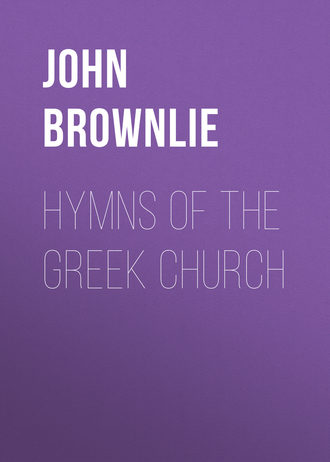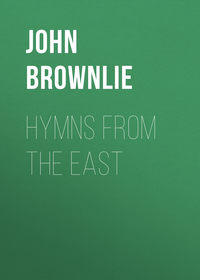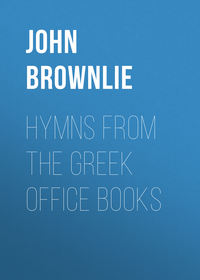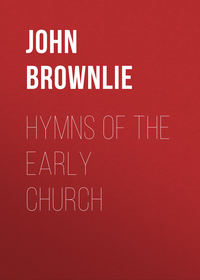 полная версия
полная версияHymns of the Greek Church

John Brownlie
Hymns of the Greek Church Translated with Introduction and Notes
SOME PRESS NOTICES
“This work at its best reaches the level of absolute excellence, and the book is entitled to a warm and grateful welcome.” —Record.
“Mr Brownlie has taste and a poetic gift, and his verses are easy and natural, rarely, if ever, betraying the fact that they are the work of a translator.” —Church Times.
“This dainty volume will certainly enhance his reputation.” —Glasgow Herald.
“It brings into dignified Church-English some sixty simple and powerful hymns. The book should prove welcome to men generally interested in hymnody, and particularly to those who are ignorant of the richness of the Greek liturgy.” —Scotsman.
“Mr Brownlie has the knack of hymn-writing, and the translations from the Greek which he has published in this book will be a welcome addition to English hymnology.” —Athenaeum.
“Mr Brownlie has done eminent service as a hymnologist and translator of hymns. These translations are in smooth and flowing English verse, and the hymns are interesting both on their intrinsic merits and as representing the religious thought and emotion of an important section of the Church.” —Aberdeen Free Press.
PREFATORY NOTE
After ten years this, the first of five series of hymns of the Greek Church, is issued in cheap form in the hope that those who regard the unity of Christian praise, and wish to realise it, and who seek its enrichment from the Church of the Apostles, may be induced to give the subject that consideration which it deserves, and which has been too long neglected.
The past ten years have seen much activity in the department of Church hymnody, – all sections of the Church have had their hymnals under revision with varied results; but in this particular we are bound to feel satisfaction that the praise literature of the Early and Mediaeval Church has been more fully drawn upon than at any former period, and the Greek Church no longer stands in the background. From this volume alone no fewer than ten renderings have been utilised by hymnal compilers, and they make together twenty appearances. This fact is mentioned to indicate an appreciation of Greek hymnody which, it is hoped, may grow.
J. B.INTRODUCTION
I. Thirty-eight years ago, Dr. John Mason Neale published his Hymns of the Eastern Church, and for the first time English readers were introduced to the priceless gems of Greek hymnody. At the close of his preface he throws out a challenge which, as far as the present writer is aware, has not yet been taken up. He says: ‘And while fully sensible of their imperfections, I may yet, by way of excuse rather than of boast, say, almost in Bishop Hall’s words —
“I first adventure: follow me who list,And be the second Eastern Melodist.”’It would be presumptuous to believe that the translations which follow are in any particular a worthy answer to that challenge; but the translator can honestly say that they are a very earnest attempt to acquaint English readers still further with the valuable praise literature which lies buried in the service-books of the Greek Church, and they constitute the first real attempt in that direction since Dr. Neale issued his collection in 1862.
II. The renderings contained in this volume are the product of many happy hours during the past five years. No method was adopted in the work. As the translator waded through the closely printed pages of the Greek offices, what appeared at first sight to be lines worthy of translation were taken up and examined, sometimes to be cast aside again because of some unremovable blemish, at other times to be moulded to the form which they now bear. Of the forty-seven pieces, thirty-five appear for the first time in English verse.
For the original, the translator has gone to the service-books, and for the most part has confined himself to the hymns which are to be found in the Triodion, containing the Lenten services; and in the Pentecostarion, in which are found the hymns for the services of Easter and Pentecost. A few specimens are also given from other offices, particularly that for Christmas.
Renderings from the work of the earlier Greek hymn-writers are added at the end of this volume; but, unlike the hymns of the Church service-books, these hymns originally are in the classical measures, and illustrate the work of the best Christian poets, who in some cases wrote extensively.
III. It is a very remarkable fact, and certainly not to our credit, that, with the exception of a very few who have made the study a specialty, our educated men show a most unaccountable ignorance of the most attractive and valuable material for praise and prayer contained in the Greek Church service-books. We have learning more than enough, and zeal enough for the pursuit of study in other departments, but this unworked field lies fallow, and no one thinks it worth his while to cultivate it. That the study will reward the student, although not in a material sense – for the meaningless prejudice of the great mass of our people for what is local and against the thought of the stranger, no matter how beautiful it may be, is still to be reckoned with – yet in the highest sense as conferring upon him a new delight, there can be no doubt; for, after the necessary expenditure of patient application, and the passing of the initiatory stages which in every department of study are somewhat trying, the attraction will begin, and the subject become positively fascinating. To any one having the lyrical gift and the necessary qualifications for the study of Greek, those service-books might prove a mine of treasure inexhaustible. In the seventeen quarto volumes which contain the Greek Church offices, there must be material of one kind or another for many thousands of hymns; yet, when hymnal compilers ask for hymns from the Greek for their collections, they are not to be had, save in the few renderings made by Dr. Neale. In the most recently compiled collection for church use —The Church Hymnary– only five pieces from the Greek find a place. What a humbling confession! They are the best available from the very small number of translations in our possession, which, perhaps, does not exceed one hundred and fifty pieces in all.
We have not treated the Latin Church after that fashion. There is not a hymn of real merit in the Latin which has not been translated, and in not a few cases oftener than once; with the result that the gems of Latin hymnody are the valued possession of the Church in all English-speaking lands.
IV. One does not proceed far before making some discoveries which may account, to a certain extent, for the neglect of Greek hymnody by men who are best qualified to pursue the study of it. The writers are not poets, in the true sense, and their language is not Greek as we have known it.
(1) None of the hymn-writers in the service-books or out of them is a poet of more than ordinary merit; although, when John of Damascus forgets his adversaries, and dispenses with his rhythmical peculiarities and gives forth the utterance of his deep emotional nature, he proves himself to be worthy of the title – the greatest of Greek Christian poets.
(2) The Greek language lived long and died slowly, and the Christian hymn-writers wrote in its decadence. It was then an instrument that has lost its fineness, and keenness, and polish – worn out and ineffective, – not the language of the men whose thoughts still charm the world, and who by its deft use gained for themselves and for their work immortality. It has little of the subtilty of expression, the variety of cadence, or the intellectual possibility, of the Greek of Homer, Plato, and Aristophanes. It is a language, moreover, crippled by the introduction of ecclesiastical and theological terms and phrases, which stubbornly refuse to lend themselves to classical rhythm. Such a language cannot be expected to have attraction for men to whom the ancient poets are a delight.
(3) The hymns of the Greek Church are all in rhythmical prose – strangely Oriental in appearance – with the exception of those by John of Damascus, which are in iambics; and difficulties confront one on every page. What lines will reward the work of rendering? Prayer, Gospel, psalm, hymn, and exhortation follow each other, and are sometimes strangely interlaced. Where does one begin and another end? Then, there is meaningless repetition which must be passed over, and expressions demanding modification. The symbolism is extravagant, and sometimes a single hymn is crowded with figures the most grotesque. The Mariolatry is excessive, and the hagiolatry offensive. Sifting and pruning are needed before a cento can be formed which would commend itself to modern taste.
But when all that is said, there remains much that is both beautiful and attractive. Some of the hymns and fragments are most chaste, – beautiful and tender in their simple expression of Gospel truths, which are so attractive to all true hearts, no matter by what creed dominated.
(4) The remarkable simplicity characterising those hymns constitutes, strangely it may seem, no small difficulty for the translator. The mere rendering of them into English prose is a comparatively easy task, and can be of no value to any one but the specialist, but to take the unmeasured lines and cut them to form stanzas, and in the process sacrifice nothing of their spirit to the exigencies of rhyme and rhythm, is a task by no means easy. But such drawbacks and difficulties are not insurmountable; and with the growing interest in hymnology which characterises our time, it will be strange if, in the years to come, the Greek service-books are not made to yield their tribute to the praise of the Christian Church in the West.
V. One prime characteristic of Greek hymnody should be referred to. Unlike the English hymn, which is intensely subjective – in some cases unhealthily so – the Greek hymn is in most cases objective. God in the glory of His majesty, and clothed with His attributes, is held up to the worship and adoration of His people. Christ, in His Person and Work, is set before the mind in a most realistic manner. His birth and its accompaniments; His life; the words He spoke, and the work He did; His Passion, in all the agony of its detail; the denial of Peter; the remorse of Judas; the Crucifixion; the darkness, the terror, the opened graves; the penitent thief; the loud cry, the death – all are depicted in plain, unmistakable language. So we have in the hymns of the Greek service-books a pictorial representation of the history of Redemption, which by engaging the mind appeals ultimately to the heart and its emotions. Our self-regarding praise is perhaps inevitable, as being the product of the meditative spirit which has its birth, and lives in the land of the twilight; but the advantages of the objectiveness of Greek hymnody are so patent, that its cultivation might be fostered by our hymn-writers, with advantage to the devotional feeling of our people and to the worship of the Church.
VI. The hymns as they appear in the original are distinguished by a variety of terms, the meaning in certain cases being extremely vague, and in others to be derived from the subject of the hymn, or from its form, or the time, place, or manner in which it is sung. As we have no corresponding terms in our language, it is necessary to retain the original.
The following collection contains specimens of some of these. They are: —
The Canon (κανών). This is the most elaborate form into which the praise of the Greek Church is cast. A canon consists, nominally, of nine odes or hymns, but the second ode is always omitted on account of the denunciations of God against Israel which it contains. The canons of the Great Fast are made up of those rejected odes.
Hirmos (εἱρμός) is the first stanza of each ode. It may or may not have a connection with the stanzas following, but its function is to give them their rhythmical model.
Troparion (τροπάριον). The Troparia are the stanzas which follow the Hirmos, and the term is doubtless derived from the verb τρέπω, to turn. The Troparia turn to the strophes of the Hirmos, as to a model.
Contakion (κοντάκιον) is a term of uncertain origin. Contakia occur after the sixth ode of a canon. They are short hymns, and the term may be derived from the Latin Canticum.
Stichera (στιχηρά) designates a series of verses which are often taken from the Psalter.
Idiomelon (ἰδιόμελον). Unlike Troparia, which follow the model set by the Hirmos, Idiomela follow no model.
Stichera Idiomela are a collection of irregular verses.
Antiphon (ἀντίφωνον) is, as is well known, a hymn sung alternately by the choir, which is divided for that purpose into two parts.
Other terms are found over hymns in the Greek service-books, but there is no need to refer to them here, as no specimens of the particular hymns find a place in this collection.
JOHN BROWNLIE.Portpatrick, N.B.
May 10th, 1900.
τῆς πατρῴας δόξης σου
(κοντάκιον)
IFar from Thy heavenly care,Lord, I have gone astray;And all the wealth Thou gav’st to me,Have cast away.IINow from a broken heart,In penitence sincere,I lift my prayer to Thee, O Lord,In mercy hear.IIIAnd in Thy blest abodeGive me a servant’s place,That I, a son, may learn to ownA Father’s grace.βασιλεῦ οὐράνιε, παράκλητε
IO King enthroned on high,Thou Comforter Divine,Blest Spirit of all Truth, be nighAnd make us Thine.IIYea, Thou art everywhere,All places far or near;O listen to our humble prayer,Be with us here!IIIThou art the source of life,Thou art our treasure-store;Give us Thy peace, and end our strifeFor evermore.IVDescend, O Heavenly DoveAbide with us alway;And in the fulness of Thy loveCleanse us, we pray.τὴν ἄχραντον εἰκόνα σου προσκυνοῦμεν
ITo Thy blest Cross, O Christ, we come,And falling down adore Thee,And humbly make confession fullOf all our sins before Thee.IIFor Thou Thyself art very God,And freely cam’st to save us;And in our flesh the fetters brokeWith which our sins enslave us.IIITherefore we own with grateful heartsThe joy the Saviour brought us,Who came to earth, and in our sinsWith love and pity sought us.Δεῦτε ἀγαλλιασώμεθα τῷ κυρίῳ
(Στιχηρὰ Ἰδιόμελα)
IO come let us adoreThe Lord of all the earth,And in our songs of praise recountThe mystery of His birth.IIThe middle wall is razed,An entrance now is free;For cherubim with sword of flameNo longer guard the tree.IIIO Paradise restored!Now I shall enter in,And taste the bliss from which I fellThrough Adam’s mortal sin, —IVFor Christ, the Father’s Son,Who God’s true image bore,Of Virgin born, in low estateOur human nature wore.VTrue God! True Man! to TheeOur earnest prayers ascend;O, of Thy loving-kindness hear,Who art the Sinners’ Friend.Χριστὸς γεννᾶται
By St. Cosmas, 760 A.Dὁ ΕἱρμόςIChrist is born, go forth to meet Him,Christ by all the heaven adored;Singing songs of welcome, greet Him,For the earth receives her Lord.All ye nations shout and sing;For He comes, your glorious King.τροπάριονIIOnce His heavenly image bearing,Man has sunk to depths of sin;Now defiled, debased, despairing,Clad in rags and foul within;But our God, who beauty gave,Lifts the soul He comes to save.IIIFrom the height of heaven beholding,Pity filled the heart of grace,And our Lord, His love unfolding,Made the earth His dwelling-place;And a virgin mother gaveGod Incarnate, man to save.IVWisdom, Might, and Word Eternal,Glory of the Father, Thou!Hid from man and powers supernal,Lo, He wears our nature now!To the Lord your worship bring,Praise Him, your victorious King.τί σοι προσενέγκωμεν, Χριστὲ
By St. Anatolius, died 458 A.DIWhat shall we bring to Thee?What shall our offering beOn this Thy natal morn?For Thou, O Christ, hast come to earth —A virgin mother gave Thee birth —For our redemption born.IIThe whole creation broadGives praise and thanks to God,Who gave His only Son;And list! the bright angelic throngTheir homage yield in sweetest songFor peace on earth begun.IIIThe heavens their glory shed,The star shines o’er His head,The promised Christ and King;And wise men from the lands afar,Led by the brightness of the star,Their treasured offerings bring.IVWhat shall we give Thee now?Lowly the shepherds bow,Have we no gift to bring?Our worship, lo, we yield to Thee,All that we are, and hope to be —This is our offering.ὁ οὐρανὸς καὶ ἡ γῆ σήμερον προφητικῶς εὐφραινέσθωσαν
(Στιχηρὰ Ἰδιόμελα)
IIn the bliss of old predicted,Heaven and earth to-day rejoice;Men and angels, one in spirit,Shout aloud in gleeful voice;For, to those in darkness drear,God in human flesh is near.IICave and manger show the mystery;Shepherds tell the wondrous tale;Bearing gifts to lay before HimFrom the East the Magi hail;Taught by angel words to sing,We unworthy praises bring.IIIGlory be to God eternal!Peace on earth its reign begin!For the one Desire of nationsComes to save us from our sin;Freedom He will now bestowFrom the bondage of the foe.Δόξα ἐν ϓψίστοις θεῷ
By St. John of Damascus, 780 A.DIBethlehem rejoices,Hark the voices clear,Singing in the starlightNearer and more near.Unto God be glory,Peace to men be given,This His will who dwellethIn the heights of heaven.IIHeaven can not contain Him,Nor the bounds of earth,Yet, O Glorious Mystery!Virgin gives Him birth.Unto God be glory,Peace to men be given,This His will who dwellethIn the heights of heaven.IIINow the light arisethIn the darkened skies,Now the proud are humbledAnd the lowly rise.Unto God be glory,Peace to men be given,This His will who dwellethIn the heights of heaven.Σήμερον ὁ Ἅδης στένων βοᾷ
(στιχηρὰ ἰδιόμελα of the Holy and Great Sabbath)
ITo-day the groans of Hades rise, —‘Ah, better far for meThe Son of Man had never diedUpon the cursèd tree!For by His power the fettered soulsI held in darkest night,Are carried through the sundered gatesInto the realm of light.’Let glory now the Cross adorn,Hail, hail the Resurrection morn!IITo-day the groans of Hades rise, —‘My might is overthrown;I took One dead, from ’mong the dead,And claimed Him for mine own;But He hath crushed my ancient power;And those I held in thrallHave thrown aside the chains they wore,And He hath rescued all.’Let glory now the Cross adorn,Hail, hail the Resurrection morn!IIITo-day the groans of Hades rise, —‘My power is gone from me;The Shepherd died upon the Cross,And Adam’s sons are free;The bars are taken from the tomb,Death can no more appal;For He who gave Himself to death,By death hath rescued all.’Let glory now the Cross adorn,Hail, hail the Resurrection morn!καὶ τὴν φλογίνην ῥομφαίαν
(κοντάκιον)
INo longer now at Eden’s gateThe fiery weapon gleams,But from the Cross that leads to lifeA light alluring streams.IIAnd now the power of Death is gone,His sting is torn away;Grim Hades can no longer claimHis silent victory.IIIFor Thou, O Saviour, didst descendWhere darkness brooding lies,And bad’st the souls in bondage heldReturn to Paradise.ὁ μονογενής Υἱὸς καὶ Λόγος τοῦ θεοῦ
(From the Liturgy of St. John Chrysostom)IThou one Begotten Son,Eternal Word adored,Immortal while the ages run,And our Almighty Lord;IITo bring Salvation nigh,To vanquish death and sin,Thou didst in cruel anguish die,And life for mortals win.IIISave us, O Christ our God,Save by Thy Cross, we pray;Thou who didst bear the Father’s rod,And death by dying slay.IVThou art the Eternal Son,One in the glorious Three;Co-equal praise while ages runShall ever rise to thee.Κύριε, ἀναβαίνοντός σου ἐν τῷ σταυρῷ
(Δόξα Ἦχος πλ. δ1)
IWhen on the cruel CrossThe Lord was lifted high,Affrighted earth in terror quailedTo see its Maker die.IIThen had the yawning cavesDevoured the murderous band,Had not the Crucified in loveStretched forth His saving hand.IIIThou gav’st Thyself to die,Dark Hades to explore,To bring to souls in prison boundNew life for evermore.IVO Lover of mankind,To Thee all glory be,For Thou didst give not death, but life,When hanging on the tree.Διὰ Λαζάρου τὴν ἔγερσιν Κύριε
(Ἀντίφωνον Γ’ Ἦχος Β’)
When Lazarus rose at Christ’s command,And God was glorified of men,The children cried Hosanna then,But Judas would not understand.Ἦχος ὁ αὐτόςWhen seated with Thy chosen bandThou didst to Thy disciples sayThat one, O Christ, would Thee betray,But Judas would not understand.ὁ αὐτόςThe sop revealed the traitor’s hand,In answer to the question made;They saw by whom Thou wert betrayed,But Judas would not understand.ὁ αὐτόςThe Jews, O Christ, Thy life demand,’Twas purchased for a price like this —For silver pieces and a kiss,But Judas would not understand.ὁ αὐτόςThou, with Thine own unstainèd hand,Didst wash the feet, and humbly teachThat such a task becometh each,But Judas would not understand.ὁ αὐτός‘Watch thou and pray,’ was Thy command,Lest, thoughtless, the disciples fallBeneath the tempter’s bitter thrall;But Judas would not understand.σήμερον γρηγορεῖ ὁ Ἰούδας
(Ἀντίφωνον Ἦχος βαρύς)
IThe wily Judas watches nearThe Master’s path to-day,That he may into wicked handsThe Eternal Lord betray,Who in the desert lone and dreadSupplied the multitudes with bread.IITo-day the wicked one deniesHis Teacher and his Friend —Once a disciple, he betraysHis Master in the end.For silver, see the Lord is sold,Who manna gave in days of old.IIIὁ αὐτόςTo-day the Jews on CalvaryA cruel Cross have raised,And nailed upon that Cross, their LordHave wickedly abased,Who made a pathway through the seaAnd led them from captivity.IVTo-day the spear is lifted highAnd thrust into His side,Who for His people raised His handAnd wounded Egypt’s pride;They give Him vinegar and gall,Who showered down manna on them all.Ὁ ἀναβαλλόμενος φῶς ὡς ἱμάτιον
(Ἀντίφωνον Ι’ Ἦχος πλ· β’)
IO Thou who cloth’st Thyself completeWith light as with a garment fair,Thou bor’st the cruel, vulgar stare,Unrobed before the judgment-seat.IIThou gav’st the hand its subtle power,But with the hand, O Lord of grace,Upon Thy pallid, careworn face,They smote Thee in that evil hour.IIIThey nailed the Lord of Glory high,And while He hung in awful pain,The temple veil was rent in twain,The sun refused to see Him die.Ἀντὶ ἀγαθῶν ὧν ἐποίησας, Χριστέ
(Ἀντίφωνον ΙΑ’ Ἦχος πλ. β’)
For all the good performed by Thee,O Christ, the Hebrews deemed it meetTo bear Thee from the judgment-seatAnd nail Thee to the cruel tree;They gave Thee vinegar and gall —But render justice to them all.ὁ αὐτός’Twas not enough they should betrayAnd nail Thee to the Cross to die;They wagged their heads and passed Thee by,And mocked Thee on that woful day;In vain they strove against Thee, Lord —Give Thou to them their due reward.ὁ αὐτόςThe quaking earth inspires no dread, —The temple veil asunder fell,The rocks were rent – still they rebel,E’en when the graves gave up their dead;But vain they strove against Thee, Lord —Give Thou to them their due reward.Κύριε, ὁ τὸν Λῃστὴν
(Ἀντίφωνον ΙΔ’ Ἦχος πλ. δ1)
IWhen Thou wert crucified by men,O Christ, for Thy companion thenThou didst accept the base and vile,Whose hand was stained with blood the while;O, number us with him, we pray!Thou who art good and kind alway.IIὁ αὐτόςFew were his words, but Thou didst hear;His faith was great, and Thou wert near;And first of men, with glad surprise,He entered opened Paradise.Be Thou for evermore adored!The needy’s prayer was not abhorred.τὰς ἑσπερινὰς ἡμῶν εὐχάς
(στιχηρὰ Ἀναστάσιμα)
IOur evening prayers attend,O Thou that holy art;In mercy full forgiveness sendTo every contrite heart;For Thou hast risen to set us free,And all mankind rejoice in Thee.IIEncompass Zion round,Ye people, tell His fame;Let Resurrection joy abound,And glory to His name;He is our Lord, who from the graveArose our sinning souls to save.IIIWith resurrection laysYe people, come, adore,And worship Him with grateful praiseWho lives for evermore;He is our God, who from the graveArose our sinning souls to save.IVLord, by Thy Passion ThouSav’st men from passions base,And by Thy Resurrection, nowDost from corruption raise.Glory to Thee we humbly bring,O Christ, who art our Heavenly King.



